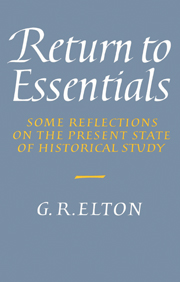3 - Some Prescriptions
Published online by Cambridge University Press: 05 June 2012
Summary
It brings some comfort to the historian to learn that the sea of troubles in which he finds himself especially in the United States is by no means unprecedented. In the later middle ages, philosophers and theologians had so far refined their analytical techniques that no two people seemed able to agree with one another on any number of the main issues of the faith: confusion reigned as well as mutual abuse and denunciation. Some people, anxious to gain reassurance about their salvation, turned away altogether from what we are now asked to call the intellectual community; they took refuge in a mysticism which renounced reason and encouraged the generality to believe in magic. But the main response among the trained thinkers turned out to be different. From the confusion and excessive subtlety of the schools there emerged what came to be called humanism: a decision to cut the cackle and rediscover essentials. The humanist cry was ‘ad fontes’, back to the sources; and anyone today who is anxious to restore sense and soundness to history will be well advised to pick up that message.
Anyone who wants to free history from the elastic bonds woven by linguists, literary critics and psychologists (the relativist nominalists of our day) without subjecting it to the arrogant rule of the social scientists (to continue the medieval parallel, the realists on the scene) is likely to find himself despised and denounced as a positivist or historicist, or both; and in the vocabulary of the day there are no more powerful terms of abuse.
- Type
- Chapter
- Information
- Return to EssentialsSome Reflections on the Present State of Historical Study, pp. 50 - 74Publisher: Cambridge University PressPrint publication year: 1991



